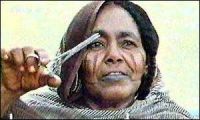Djibouti conference issues declaration against female circumcision
DJIBOUTI, Feb 4 (AFP) — A conference of about 300 experts mainly from Horn of Africa nations has issued a “Djibouti Declaration” against the practice of female circumcision, considered “a violation of human rights”.

|
|
Female Genital Cutting (FGC)- Untrained FGC Practitioner.(photo Vitrade). |
Such female genital mutilation, said the statement published after a conference in Dibouti on Wednesday and Thursday, must be abandoned as “a violation of human rights, more especially those of women and girls, and an insult to their dignity.”
The declaration added that the traditional practice in use in many African countries, often illegally, has no religious basis. It was approved by delegates from Dibouti, Egypt, Eritrea, Ethiopia, Somalia, Sudan and Yemen.
Circumcision, which is already a health risk because many practitioners lack appropriate medical equipment, can range from the stitching up of young girls’ vaginas to the excision of the clitoris. The UN World Health Organisation estimates that between 120 and 130 million women, mainly in Africa, have suffered such mutilation.
“No religious basis in the Koran — as morever in other religious revealed scriptures (Christianity and Judaism) justifies the perpetuation” of circumcision, said the delegates, who also expressed opposition to bids to make the practice medically safer as opposed to enforcement of laws banning it.
“Implementing legislation must be an integral part of a multi-disciplinary approach,” the Dibouti Declaration said.
Djibouti, a small country at the meeting point of the Red Sea and the Gulf of Aden, on Thursday became the sixth country to ratify a Maputo Protocol adopted by African Union heads of state in July 2003, according to the non-governmental organisation “No Peace Without Justice”.
In 2002, Djibouti’s health ministry released a survey concluding that 98 percent of women in the country had been excised despite the outlawing of the practice by the Penal Code in 1995.
